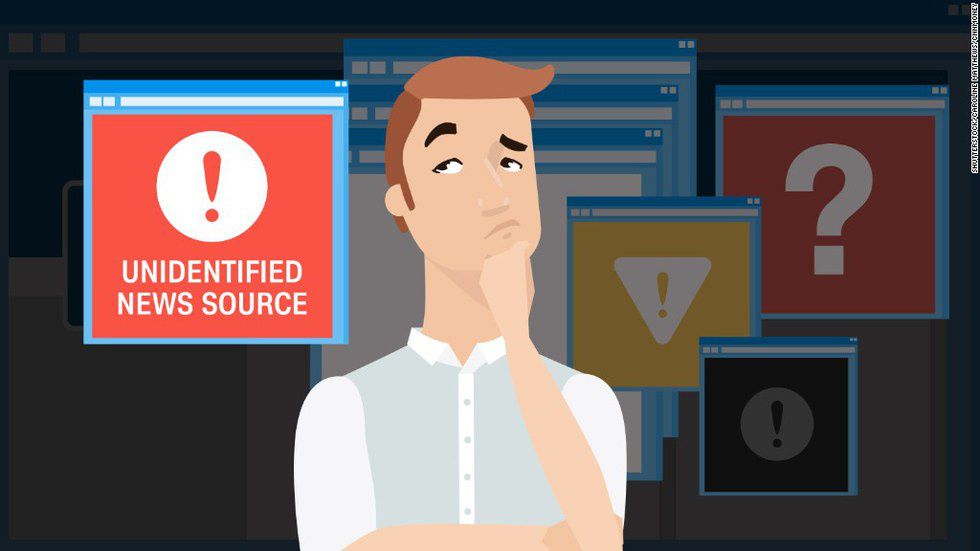The Internet is a vast source of news for many people—62% get their news from social media. It is easy to skew and politicize news in your favor, hence the major issue of fake news. Fake news, prevalent on both sides, normalizes the worst conditions of humanity. One of those conditions is misogyny.
The most recent example I can think of is the controversy surrounding Emma Watson, Vanity Fair, and Beyoncé. You've heard of it by now, either from the million and some think pieces or just by scrolling on your social media feeds. In short, Watson was criticized for this photo in Vanity Fair:
(Photo credit: Vanity Fair)
Some took to criticizing Watson, claiming her feminism was invalid if she revealed so much skin. It's a timeless argument—women cannot be sexy and feminist at once. Watson challenged the claims during an interview:
— NEW Emma addresses Vanity Fair photoshoot controversy [part 1] @EmmaWatson #EmmaWatson
A post shared by Emma Watson News 🥀 (@emmacwatsons) on
<script async defer src="//platform.instagram.com/en_US/embeds.js"></script>
However, her feminism was challenged once again when an old quote about Beyoncé from Wonderland magazine resurfaced:
"On the one hand she is putting herself in a category of a feminist, this very strong woman — and she has that beautiful speech by Chimamanda Ngozi Adichie in one of her songs — but then the camera, it felt very male, such a male voyeuristic experience of her and I just wondered if you had thoughts about that?"
Out of context, the quote is misogynistic and reinforces the hyper-sexualization of black women. So a white woman like Emma Watson can be sexual, but a black woman like Beyoncé cannot? It is deeply hypocritical.
Watson later posted the entirety of her comments, where she explains herself:
This is the part of my 2014 interview with Tavi where we talked about Beyoncé. My words are in bold. pic.twitter.com/Y8vumOeyDT<script async src="//platform.twitter.com/widgets.js" charset="utf-8"></script>
— Emma Watson (@EmmaWatson) March">https://twitter.com/EmmaWatson/status/839005241978... 7, 2017
You can read the entire interview here.
Watson was, in fact, fangirling over Beyoncé. One of the most compelling aspects of Beyoncé’s art is how she co-opts the male gaze. Whether or not Beyoncé is expressing her sexuality for someone else, it’s clear that every part of her art is consensual and self-directed. What makes her art even more empowering is that she’s a black woman. Black women are often hyper-sexualized in mainstream media. Beyoncé takes the narrative of the hyper-sexualized black woman and rewrites it into a black feminist proclamation. In context, Watson is praising Beyoncé.
I was shocked at how quickly the quote was spread and criticized. Anyone can appear malicious when their words are taken out of context. The incident echoed that of the U.S. election, when soundbites of Hillary Clinton's paid speeches were misconstrued and then polarized. It was as if everyone vowed to fact check only the week after the U.S. election and then forgot their promise, sinking back into their biases.
(Photo credit: Slate)
What this particular situation revealed were two things: 1) the prevalence of insidious assumptions that surround women who make mistakes and 2) the pervasive and successful nature of fake news to fool.
Even after Watson’s quote was clarified, many still wanted an apology. But an apology for what? Watson has discussed her privilege before and, in this instance, has nothing to apologize for. She would be apologizing for words she never said, for the comfort of a few. I worry about the implications of asking others to apologize for words they never said and actions they never carried out. Essentially, in this context, people are asking someone to apologize for fake news about them.
The story about Watson displaying "peak white feminism" probably garnered a lot of clicks. Watson, an intelligent activist who has been working for years with organizations like the United Nations to help women and minorities around the world, was reduced to a caricature in the name of falsehood. It shouldn't have taken her posting the full quote for the controversy to die when the transcript had been available online. Again, I was reminded of the out of context Clinton quotes.
A few days later, Gloria Steinem’s words about white feminism were taken out of context as well. The headline read:
Gloria Steinem: There Is No Such Thing As “White Feminism”
At first glance, Steinem is dismissing a dangerous off-shoot of feminism that places white women at the forefront of a movement created by women of color. But this was Steinem’s actual quote:
Steinem was adamant about the fact that "white feminism" as a term has no place in the discourse about gender equality. “There is no such thing as white feminism. If you call it white, it’s not feminism. It either includes all women, or it’s not feminism," she said. Steinem also pointed out that black women were a major driving force of the feminist movement, particularly during her heyday in the 1970s.
“Disproportionately, African American women invented feminism, and if you call it a white movement, you’ve eradicated…hundreds and hundreds of people who I learned from, who were my teachers," Steinem told the group.
Here’s the thing: white women like Emma Watson and Gloria Steinem are not perfect feminists. They have slipped up every now and again in regards to intersectionality. Their flaws warrant criticism. A feminist only stands to become a better feminist by unlearning society’s harmful messages, after all. Mistakes will be made in the process. Furthermore, feminists do not deserve brownie points for unlearning problematic behavior and thinking. It’s part of the duty of being a feminist.
And in no way do I criticize the skepticism of white people by racial minorities—after all, most white people voted for Trump in the U.S. election. It is also easiest for white people to fall in line with white feminism. Seeing that quote, especially out of context, caused a lot of pain. And that pain is justified.
(Photo credit: New York Times)
However, it is still imperative that we fact check. The acceptance of any amount of fake news is dangerous. For example, the Watson quote was circulated by the likes of Piers Morgan, who is notorious for bashing women and minorities at every chance he gets. That alone should’ve rung a mental alarm bell. Instead, I saw more op-eds about Watson’s white feminism produced in that conflated week than I saw of Trump, European politics, and the Russian connection. White feminism is a very real concern, but if we inaccurately label it then we are contributing to the problem. For example, pointing to Watson’s out of context quote and declaring it to be that of a white feminist’s is calling her entire quote a product of white feminism. Praising a prominent black artist for co-opting her sexuality from the male gaze is not an example of white feminism.
Fighting fake news has always been part of feminism as well. Just realizing this during the most recent election cycle is a sign of privilege. Powerful women are threatening to the status quo, and a heinous media reception is to be expected. If a woman takes on the role of activist, people will find even more excuses to tear her down. This is especially true for women of color, disabled women, neurodivergent women, women who are religious minorities, and LGBTQ+ women. To fall for fake news, especially when it is avoidable, is to assist the oppressive forces or society. Be it accidental or not, we must all be more vigilant when we read and process news.
We cannot expect any woman to bow down to the onslaught of fake news. Fake news has a highly politicized agenda behind it. It’s not simply a phenomena of right-wing extremism—it’s a threat to anyone who believes in progress and equality. Fake news counts on us to believe everything we see at face value rather than think critically. It counts on us to read quotes and not look for context. It counts on us to read headlines instead of whole articles. It counts on us to give in to our biases rather than reality. Too many people gave in to these faults when reading about Watson, Steinem, and Clinton.
(Photo credit: CNN)
You cannot claim to have learned the lessons of the past election cycle if you consistently fall for fake news. If you need help discerning between real and fake news, read this handy guide from TED.
Feminism is not an easy thing to begin with. When you call yourself a feminist, you have agreed to take on the lifelong task of unlearning notions that normalize inequality. That task is easier said than done. But giving in to fake news again and again is an act of complacency. Making a mistake over and over promotes reinforcement of the mistake, not the unlearning of it.
If you don't have the time to fully take in news, you cannot make an informed comment about it. And it is misinformation that promotes fake news.
Fake news is the metaphorical drug of choice for misogynists. Assange, Trump, and Putin—three men with three different ideological beliefs—were able to connect through fake news. All three are known misogynists—Assange is currently in hot water for sexual assault, Trump is known for his rampant sexism, and Putin has promoted the degradation of women through his legal means. Through fake news and misogyny, all three were able to rise to power in some form. Even people who disavow those three figures in particular have fallen for fake news at one point or another. Bernie-or-Busters and third party voters on the left often read Wikileaks without question, despite proof that the organization has been known to doctor the information it receives before leaking it. GOP supporters and third party voters on the right often subscribed to the likes of Breitbart for news, despite the fact that so-called news sources like Breitbart are notorious for their sloppy and heavily biased reporting. Women, especially those who are marginalized, stand to suffer the most from fake news. We cannot afford to aid it. Therefore, it is far more productive to combat fake news rather than its targets.
It is a feminist obligation to fight for the truth. We must fight for it on all levels. We must all work hard to dismantle the biases that alienate others, particularly those which bring harm to vulnerable women and minorities, and make us susceptible to fake news. We cannot afford to do otherwise. Not now, not ever.

























